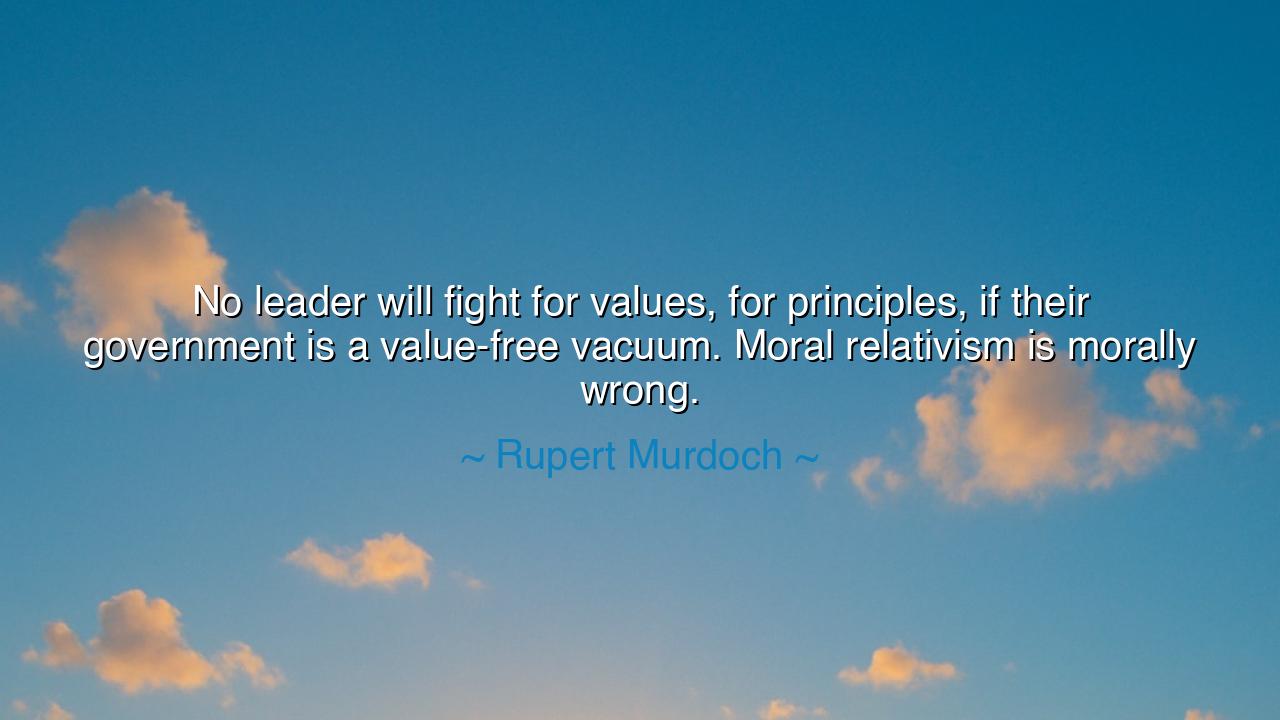
No leader will fight for values, for principles, if their
No leader will fight for values, for principles, if their government is a value-free vacuum. Moral relativism is morally wrong.






When Rupert Murdoch declared, “No leader will fight for values, for principles, if their government is a value-free vacuum. Moral relativism is morally wrong,” he was not merely offering a critique of politics — he was issuing a warning to civilization itself. His words strike at the heart of an age drifting toward indifference, where truth is treated as opinion and virtue as inconvenience. Murdoch, a man who has spent a lifetime shaping the global conversation through the press, understood a deep and ancient truth: that a nation without moral conviction cannot stand. The pillars of freedom and justice do not rest upon laws alone, but upon the shared belief that some things are eternally right — and others eternally wrong.
The origin of this quote comes from Murdoch’s reflections on the decay of moral clarity in public life. Speaking as both a businessman and a cultural observer, he lamented how moral relativism — the belief that truth and right depend solely on personal or cultural perspective — had corroded the conscience of leadership. When governments refuse to anchor themselves in firm principles, when they try to please all by believing in nothing, they create what he calls a “value-free vacuum.” In such emptiness, the noble qualities of leadership — courage, conviction, and sacrifice — wither. For a leader cannot champion justice if he does not believe in the existence of justice itself. He cannot defend truth if he doubts that truth exists.
In the style of the ancients, Murdoch’s words echo the voices of philosophers who warned that the loss of moral foundation is the beginning of societal collapse. The Greeks spoke of hubris, the arrogance that arises when man replaces divine order with his own desires. The Romans saw their republic crumble not from invasion, but from moral decay — when wealth, comfort, and corruption became more precious than honor, duty, and discipline. Likewise, Murdoch reminds us that when governments abandon principle for convenience, they sow the seeds of their own undoing. A leader without values may rule for a time, but he cannot inspire. He may hold office, but he cannot command respect.
Consider the tragedy of Weimar Germany, where moral relativism — born of exhaustion after war — eroded the nation’s spirit. In the 1920s, as corruption and cynicism spread, the people grew weary of principle and yearned for strength, even at the cost of truth. Into that moral vacuum stepped Adolf Hitler, who offered not righteousness but certainty — and a world, desperate for meaning, followed him into ruin. Murdoch’s warning, though spoken in modern times, is ancient in its essence: that evil does not triumph because it is powerful, but because the good lose their moral compass. A society that rejects moral truth creates the very void in which tyranny takes root.
Yet Murdoch’s statement is not only a condemnation; it is also a call to renewal. He reminds leaders — and all who hold power, great or small — that to govern wisely, one must first believe in something greater than oneself. A leader’s strength is not measured by popularity, but by conviction. The man who bends with every wind of public opinion may survive politically, but he dies morally. To fight for values, one must be willing to lose for them. History remembers not those who compromised truth for comfort, but those who defended it against the tide.
There is a profound emotional power in the second half of the quote: “Moral relativism is morally wrong.” It is both paradox and prophecy — a challenge to the modern tendency to blur all distinctions between good and evil. Murdoch insists that some truths are absolute: that justice, integrity, and human dignity are not opinions, but obligations. Without such absolutes, governments become puppets of circumstance, and leaders become merchants of convenience. To reject moral truth is to reject meaning itself.
The lesson of this quote is clear and eternal: a society that abandons moral conviction invites moral chaos. Each citizen, like each leader, bears the responsibility of upholding truth not as a weapon, but as a compass. Let governments be guided not by fashion, but by principle; let leaders remember that power without virtue is poison. The individual, too, must live by conscience — speaking truth even when it costs comfort, doing right even when it brings hardship. For it is through such steadfastness that nations rise, and through moral weakness that they fall.
So let Murdoch’s words be carried forward as a torch in an age of fog: that truth is not what we invent, but what we inherit and must defend. No empire, no democracy, no institution can endure if it forgets its soul. And therefore, as the ancients would have said — let every leader remember this sacred law: the might of a nation lies not in its armies or wealth, but in the virtue of its people, and in the courage of those who will fight for truth when all else is silent.






AAdministratorAdministrator
Welcome, honored guests. Please leave a comment, we will respond soon